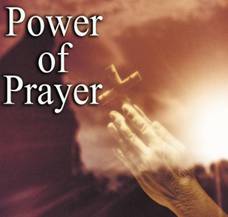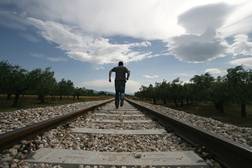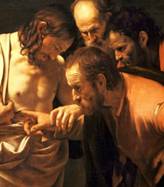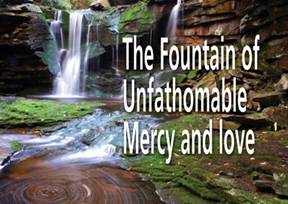July 1 to July 6 - abbey
Main menu:
- Home Page
- Abbey
- Apiary
- Documents
- Monastic
- Spirituality
- Apostleship of the Sea
- Homilies of Pope Francis
July 1 to July 6
Pope Francis: prayer requires courage, tenacity
We must pray with courage to the Lord and with tenacity just as Abraham did. That’s what Pope Francis said to the faithful gathered for Mass on Monday July 1. Abraham’s courage and tenacity in appealing to the Lord to spare the city of Sodom from destruction is worth praising. Abraham is a courageous man and prays with courage. He found the strength to speak face to face with the Lord and attempts to defend that city. And he does it with tenacity. In other words prayer is negotiating with God and must be courageous. When we speak of courage we always think of apostolic courage – going out to preach the Gospel, these sort of things…But there’s also (the kind of) courage (demonstrated) before the Lord. That sense of paralysis before the Lord: going courageous before the Lord to request things. It makes you laugh a bit; this is funny because Abraham speaks with the Lord in a special way, with this courage, and one doesn’t know: is this a man who prays or is this a‘phoenician deal’ because he’s bartering the price, down, down…And he’s tenacious: from fifty he’s succeeded in lowering the price down to ten. He knew that it wasn’t possible. Only that it was right…. But with that courage, with that tenacity, he went ahead.
When we speak of courage we always think of apostolic courage – going out to preach the Gospel, these sort of things…But there’s also (the kind of) courage (demonstrated) before the Lord. That sense of paralysis before the Lord: going courageous before the Lord to request things. It makes you laugh a bit; this is funny because Abraham speaks with the Lord in a special way, with this courage, and one doesn’t know: is this a man who prays or is this a‘phoenician deal’ because he’s bartering the price, down, down…And he’s tenacious: from fifty he’s succeeded in lowering the price down to ten. He knew that it wasn’t possible. Only that it was right…. But with that courage, with that tenacity, he went ahead.
Sometimes, one goes to the Lord to ask something for someone one asks for a favor and then goes away. But that is not prayer, because if you want the Lord to bestow a grace, you have to go with courage and do what Abraham did, with that sort of tenacity. Jesus himself tells us that we must pray as the widow with the judge, like the man who goes in the middle of the night to knock on his friend’s door. With tenacity. In fact, Jesus himself praised the woman who tenaciously begged for the healing of her daughter. Tenacity, even though it’s tiring, is really tiresome. But this is the attitude of prayer. Saint Teresa, speaks of prayer as negotiating with the Lord and this is possible only when there’s familiarity with the Lord. It is tiring, it’s true, but this is prayer, this is receiving a grace from God, the same sort of reasoning that Abraham uses in his prayer: take up the arguments, the motivations of Jesus’ own heart.
“To convince the Lord with the Lord’s own virtues! That is beautiful! Abraham’s appeal goes to the heart of the Lord and Jesus teaches us the same: the Father knows things. The Father – don’t worry – sends rain down on the just and the sinners, the sun for the just and for the sinners. With that argumentation, Abraham forges ahead. I will stop here: praying is negotiating with the Lord, even becoming inappropriate with the Lord. Praying is praising the Lord in the beautiful things he shares and telling him that he bestow these beautiful things on us. And (appealing to him) who is so merciful, so good, to help us!”
Pope Francis then urged everyone to spend no more than five minutes each day to read Psalm 102:
instructing them that we must say to the Lord when we request a grace: just as Abraham and as Moses did. We forge ahead in prayer, courageous, and with these motivations which come right from the heart of God himself.
Pope at Mass: Courage in spite of our weaknesses
Christians are called to be courageous in their weakness. We must recognize that we are weak and that at times we have to flee from sin without nostalgia, without looking back. We must not let temptation or fear keep us from God. Instead we must learn that he who fights and runs away lives to fight another day! This was the lesson at the heart of Pope Francis’ homily at morning Mass on Tuesday July 2. Pope Francis took his cue from the daily readings to dwell on four possible attitudes in conflict situations and in difficult situations. The first attitude is that of the slowness of Lot. He decided to leave the city before it was destroyed, but he does so slowly. The angel tells him to run away, but he carries within an inability to detach himself from evil and sin. We want to go out, we are determined but there is something that pulls us back and so Lot begins to negotiate even with the angel. It’s so hard to cut ties with a sinful situation. It is hard! Even in a temptation, it's hard! But the voice of God tells us this word: Escape! You cannot fight there, because the fire, the sulfur will kill you. Escape! St. Therese of the Child Jesus taught us that sometimes, in some temptations, the only solution is to escape and not be ashamed to escape, to recognize that we are weak and we have to escape. And our popular wisdom, in its simplicity, says as much, somewhat ironically: 'he who fights and runs away, lives to fight another day. Escaping is to go forward along the path of Jesus. Do not look back when you escape but keep your eyes faced forward, is an advice on how to overcome our nostalgia of sin. Think of the People of God in the desert, they had everything, promises, everything. And yet they were nostalgic for the onions of Egypt and this longing made them forget that they ate those onions on the table of slavery. There was the longing to go back, to return. And the advice of the angel is wise: Do not look back! Move ahead! We must not do as Lot's wife did, we must leave behind all nostalgia, because there is also the temptation of curiosity.
It’s so hard to cut ties with a sinful situation. It is hard! Even in a temptation, it's hard! But the voice of God tells us this word: Escape! You cannot fight there, because the fire, the sulfur will kill you. Escape! St. Therese of the Child Jesus taught us that sometimes, in some temptations, the only solution is to escape and not be ashamed to escape, to recognize that we are weak and we have to escape. And our popular wisdom, in its simplicity, says as much, somewhat ironically: 'he who fights and runs away, lives to fight another day. Escaping is to go forward along the path of Jesus. Do not look back when you escape but keep your eyes faced forward, is an advice on how to overcome our nostalgia of sin. Think of the People of God in the desert, they had everything, promises, everything. And yet they were nostalgic for the onions of Egypt and this longing made them forget that they ate those onions on the table of slavery. There was the longing to go back, to return. And the advice of the angel is wise: Do not look back! Move ahead! We must not do as Lot's wife did, we must leave behind all nostalgia, because there is also the temptation of curiosity.
Faced with sin, we must escape without any nostalgia. Curiosity does not help, it hurts! But, in this sinful world, what can we do? What is this sin like? I would like to know . . . ' No, do not! This curiosity will hurt you! Run away and do not look back! We are weak, all of us, and we must defend ourselves. The third situation is on the boat: it is fear. When there is great upheaval at sea, the boat was covered with the waves. 'Save us, Lord, we are lost!' they say. Fear! Even that is a temptation of the devil: to be afraid to move forward on the path of the Lord. There is a temptation that says it is better to stay here, where I'm safe. But this is the slavery of Egypt. I fear moving forward, I'm afraid of where the Lord will bring me. Fear, however, is not a good counselor. Jesus, so many times, said: 'Do not be afraid.' The fourth attitude is the grace of the Holy Spirit. When Jesus calms the agitated sea, the disciples on the boat are filled with awe. Faced with sin, nostalgia, fear, we must always turn to the Lord.
Looking at the Lord and contemplating Him, gives us the beautiful wonder of a new encounter with the Him. We must not be naive nor lukewarm Christians, but brave and courageous. We are weak, but we must be courageous in our weakness. And often our courage must be expressed in escaping without looking back, so as not to fall into the trap of wicked nostalgia. Do not be afraid and always look to the Lord!
We encounter the Living God through His wounds
To meet the living God we must tenderly kiss the wounds of Jesus in our hungry, poor, sick. Study, meditation and mortification are not enough to bring us to encounter the living Christ. This was the lesson drawn by Pope Francis during morning Mass on Wednesday July 3, as he marked the Feast of St. Thomas Apostle.  Jesus after the Resurrection, appears to the apostles, but Thomas is not there: He wanted him to wait a week. The Lord knows why he does such things. And he gives the time he believes best for each of us. He gave Thomas a week. Jesus reveals himself with his wounds: His whole body was clean, beautiful, full of light, but the wounds were and are still there and when the Lord comes at the end of the world, we will see His wounds. In order to believe, Thomas wanted to put his fingers in the wounds. He was stubborn. But the Lord wanted exactly that, a stubborn person to make us understand something greater. Thomas saw the Lord, was invited to put his finger into the wounds left by the nails; to put his hand in His side and he did not say, It's true: the Lord is risen'. No! He went further. He said: 'God'. The first of the disciples who makes the confession of the divinity of Christ after the Resurrection. And he worshiped Him. We understand what the Lord’s intention was when he made him wait: he wanted to guide his disbelief, not to an affirmation of the Resurrection, but an affirmation of His Divinity. The path to our encounter with Jesus-
Jesus after the Resurrection, appears to the apostles, but Thomas is not there: He wanted him to wait a week. The Lord knows why he does such things. And he gives the time he believes best for each of us. He gave Thomas a week. Jesus reveals himself with his wounds: His whole body was clean, beautiful, full of light, but the wounds were and are still there and when the Lord comes at the end of the world, we will see His wounds. In order to believe, Thomas wanted to put his fingers in the wounds. He was stubborn. But the Lord wanted exactly that, a stubborn person to make us understand something greater. Thomas saw the Lord, was invited to put his finger into the wounds left by the nails; to put his hand in His side and he did not say, It's true: the Lord is risen'. No! He went further. He said: 'God'. The first of the disciples who makes the confession of the divinity of Christ after the Resurrection. And he worshiped Him. We understand what the Lord’s intention was when he made him wait: he wanted to guide his disbelief, not to an affirmation of the Resurrection, but an affirmation of His Divinity. The path to our encounter with Jesus-
In the history of the Church there have been some mistakes made on the path towards God. Some have believed that the Living God, the God of Christians can be found on the path of meditation, indeed that we can reach higher through meditation. That's dangerous! How many are lost on that path, never to return. Yes perhaps they arrive at knowledge of God, but not of Jesus Christ, Son of God, Second Person of the Trinity. They do not arrive at that. It is the path of the Gnostics, no? They are good, they work, but it is not the right path. It’s very complicated and does not lead to a safe harbor. Others thought that to arrive at God we must mortify ourselves, we have to be austere and have chosen the path of penance: only penance and fasting. Not even these arrive at the Living God, Jesus Christ. They are pelagians, who believe they can arrive by their own efforts. But Jesus tells us that the path to encountering Him is to find His wounds.
We find Jesus’ wounds in carrying out works of mercy, giving to our body – the body – the soul too, but –the body of your wounded brother, because he is hungry, because he is thirsty, because he is naked because it is humiliated, because he is a slave, because he's in jail because he is in the hospital. Those are the wounds of Jesus today. And Jesus asks us to take a leap of faith, towards Him, but through these His wounds. Oh, great! Let's set up a foundation to help everyone and do so many good things to help. That's important, but if we remain on this level, we will only be philanthropic. We need to touch the wounds of Jesus, we need to bind the wounds of Jesus with tenderness, we have to kiss the wounds of Jesus, and this literally. Just think of what happened to St. Francis, when he embraced the leper? The same thing that happened to Thomas: his life changed. We do not need to go on a “refresher course” to touch the living God, but to enter into the wounds of Jesus, and for this all we have to do is go out onto the street. Let us ask St. Thomas for the grace to have the courage to enter into the wounds of Jesus with tenderness and thus we will certainly have the grace to worship the living God.
Pope Francis: the courage of children of God
 The Pope’s homily was centered on the Gospel of the healing of a paralytic. At the beginning of the Gospel, Jesus says to him: “Courage, child, your sins are forgiven.” Perhaps, this person remained “unsettled” because he wanted to be physically healed. In spite of facing the criticism of the scribes, who among themselves had accused him of blasphemy that only God can forgive sins–Jesus healed his physical condition. In reality, the healings, the teaching, the strong words against hypocrisy were only a sign, a sign of something more that Jesus was doing, namely, the forgiveness of sins: In Jesus the world is reconciled with God. This is the most profound miracle.
The Pope’s homily was centered on the Gospel of the healing of a paralytic. At the beginning of the Gospel, Jesus says to him: “Courage, child, your sins are forgiven.” Perhaps, this person remained “unsettled” because he wanted to be physically healed. In spite of facing the criticism of the scribes, who among themselves had accused him of blasphemy that only God can forgive sins–Jesus healed his physical condition. In reality, the healings, the teaching, the strong words against hypocrisy were only a sign, a sign of something more that Jesus was doing, namely, the forgiveness of sins: In Jesus the world is reconciled with God. This is the most profound miracle.
This reconciliation is the re-
This is the greatest miracle. And what does Jesus accomplish with this? He makes us sons, with the liberty of sons. Because of what Jesus has done, we can say ‘Father.’ [If He had not done so] we would never have been able to say this: ‘Father!’ And to say ‘Father’ with so good and so beautiful an attitude, with liberty! This is the great miracle of Jesus. We, who were slaves of sin – He has made us all free, He has healed us at the very core of our existence. We would do well to think about this, and to think how beautiful it is to be children, and how beautiful this ‘liberty of children’ is, because the child is in the house, and Jesus has opened the doors of the house to us . . . Now we are in the house!
We can understand when Jesus said “Courage, child, your sins are forgiven” That is the root of our courage: I am free, I am a child… The Father loves me, and I love the Father! Let us ask the Lord for the grace to truly understand this work of His, what God has done in Him: God has reconciled the world to Himself in Christ, entrusting to us the word of reconciliation and the grace of bearing this word of reconciliation onward, forcefully, with the liberty of children. We are saved in Jesus Christ! And no one can take from us this ‘identity card.’ This is how I identify myself: as a child of God! What a beautiful identity! Civil status: we are free! Amen.
Jesus feasts with sinners and offers forgiveness to them
The heart of God’s message is Mercy was the main theme of Pope Francis Mass on 5th July. In his homily, Pope Francis drew the attention on the Gospel reading from Matthew: “I desire mercy, not sacrifice.” Pope Francis repeated Jesus’ words to the Pharisees who criticize the Lord for sharing a meal with sinners. The tax-
Jesus, then, sees Mathew, the tax collector, and looks upon him with mercy: Matthew feels Jesus’ gaze upon him and “he feels stunned; he hears Jesus’ invitation: ‘Follow me! Follow me!’ At that moment, this man is full of joy but he’s also doubtful because he’s also very attached to money. It just took a moment – and we see how (the artist) Caravaggio was able to capture it: that man, who was looking, but also, with his hands, was taking the money. Only a moment, in which Matthew says yes, leaves everything and goes with the Lord. It is the moment of mercy received and accepted: ‘Yes I’m coming with you!’ And it is the first moment of the meeting, a profound spiritual experience.” The second moment comes as a feast. “The Lord feasts with the sinners”: God’s mercy is celebrated.
Following these two moments, the stunned encounter and the feast: the daily work of announcing the Gospel: must be nurtured with the memory of that first encounter, of that feast. And this is not one moment: up to the end of life. Memory. Memory of what? of those events! of that encounter with Jesus who has changed my life! ..who had mercy! ..who was so good to me and who told me also: invite your friends who are sinners so we can have a feast! That memory gives Matthew strength and to all of them to forge ahead. The Lord has changed my life! I met the Lord! Remember always. It is like blowing on the embers of that memory, no? Blowing to keep the fire alive and always.
The Biblical parables talk of those who refuse to take part in the Lord’s feast. And Jesus went out to find the poor, the sick and he feasted with them. Jesus is continuing this habit, feasts with the sinners and offers forgiveness to sinners. I desire mercy, not sacrifice. I did not come to call the righteous but the sinners. Those who consider themselves righteous, they can cook in their own stew! He came for us sinners and this is beautiful. Let us be regarded by Jesus’ mercy; let us celebrate and remember this salvation!
The Holy Spirit renews our lives
In his Mass on Saturday 6th July Pope Francis said that being Christian does not mean doing things, but allowing oneself to be renewed by the Holy Spirit.” He emphasized saying that even in the life of the Church there are ancient structures to be renewed without fear. “New wine in new wineskins.” He spoke of the renewal that Jesus brings. The doctrine of the law is enriched, renewed with Jesus, who makes all things new. He brings a true renewal of the law, the same law, but more mature. He explained that what Jesus requires of us is greater than the requirements of the law. The law allows us to hate our enemy; Jesus, on the other hand, tells us to pray for our enemies. This, then, is the Kingdom of God that Jesus preaches: a renewal above all in our heart.
“New wine in new wineskins.” He spoke of the renewal that Jesus brings. The doctrine of the law is enriched, renewed with Jesus, who makes all things new. He brings a true renewal of the law, the same law, but more mature. He explained that what Jesus requires of us is greater than the requirements of the law. The law allows us to hate our enemy; Jesus, on the other hand, tells us to pray for our enemies. This, then, is the Kingdom of God that Jesus preaches: a renewal above all in our heart.
We think that being Christian means doing this, or doing that; but it is not so. Being Christians means allowing oneself to be renewed by Jesus in the new life. I am a good Christian, I go to Mass every Sunday from 11 till noon, I do this, I do that, as if it were a collection. But the Christian life is not a collage of things. It is a harmonious whole, harmonious, and the Holy Spirit does it! He renews all things: He renews our heart, our life, and makes us live differently, but in a way that takes up the whole of our life. You cannot be a Christian of pieces, a part time Christian. Being a part- The newness of the Gospel, is really new, but in the same law that comes in the history of Salvation. And this newness, goes beyond us, it renews us and renews the structures. This is why Jesus says that new wineskins are necessary for new wine: In the Christian life, even in the life of the Church, there are old structures, passing structures: it is necessary to renew them! And the Church has always been attentive to this, with dialogue with cultures. It always allows itself to be renewed according to places, times, and persons. The Church has always done this! From the very first moment, we remember the first theological battle: was it necessary to carry out all of the Jewish practices in order to be Christian? No! The gentiles could enter as they are: gentiles. Entering into the Church and receiving Baptism. And so the Church always goes forward, giving space to the Holy Spirit that renews these structures, structures of the churches. Don’t be afraid of that! Don’t be afraid of the newness of the Gospel! Don’t be afraid of the newness that the Holy Spirit works in us! Don’t be afraid of the renewal of structures! The Church is free: the Holy Spirit carries her forward. The Gospel teaches this: the liberty to find always the newness of the Gospel in us, in our life, and even in our structures. He then spoke on the importance of the freedom to choose new wineskins for this newness. The Christian is free, with that liberty that Jesus gives us. A Christian is not a slave of habits, of structures. The Spirit carries [the Christian] forward.
The newness of the Gospel, is really new, but in the same law that comes in the history of Salvation. And this newness, goes beyond us, it renews us and renews the structures. This is why Jesus says that new wineskins are necessary for new wine: In the Christian life, even in the life of the Church, there are old structures, passing structures: it is necessary to renew them! And the Church has always been attentive to this, with dialogue with cultures. It always allows itself to be renewed according to places, times, and persons. The Church has always done this! From the very first moment, we remember the first theological battle: was it necessary to carry out all of the Jewish practices in order to be Christian? No! The gentiles could enter as they are: gentiles. Entering into the Church and receiving Baptism. And so the Church always goes forward, giving space to the Holy Spirit that renews these structures, structures of the churches. Don’t be afraid of that! Don’t be afraid of the newness of the Gospel! Don’t be afraid of the newness that the Holy Spirit works in us! Don’t be afraid of the renewal of structures! The Church is free: the Holy Spirit carries her forward. The Gospel teaches this: the liberty to find always the newness of the Gospel in us, in our life, and even in our structures. He then spoke on the importance of the freedom to choose new wineskins for this newness. The Christian is free, with that liberty that Jesus gives us. A Christian is not a slave of habits, of structures. The Spirit carries [the Christian] forward.
On the day of Pentecost, Mary was there with the disciples: and where the mother is, the children are safe! All of them! Let us ask for the grace of not being afraid of the newness of the Gospel, of not being afraid of the renewal that the Holy Spirit brings, of not being afraid to let go of the passing structures that imprison us. If we are afraid, we know that the Mother is with us. And like children who are a little afraid, let us go to Her – and she, as the ancient antiphon says, ‘will protect us with her cloak, with her motherly protection.’ Amen.